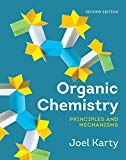
Concept explainers
(a)
The major organic product of the given reaction sequence is to be predicted.
Concept introduction:
Sodium hydride,
(b)
Interpretation:
The major organic product of the given reaction sequence is to be predicted.
Concept introduction:
Sodium hydride,
(c)
Interpretation:
The major organic product of the given reaction sequence is to be predicted.
Concept introduction:
Sodium hydride,
Want to see the full answer?
Check out a sample textbook solution
Chapter 17 Solutions
Organic Chemistry: Principles and Mechanisms (Second Edition)
- Provide the full mechanism and major products for each of the following reactions.arrow_forwardDraw the mechanism and the major organic product for each of the following reactions.arrow_forwardDraw the complete mechanism and the major organic product for each of the following reactions.arrow_forward
- Predict the major product of each of the reactions shown here and provide the complete, detailed mechanism.arrow_forwardDraw the complete, detailed mechanism and the products for each of the following reactions.arrow_forwardPredict/draw the major product of the reaction shown in the picture:arrow_forward
- Solve correctly please. With explanation also. (Answer only if sure) What is the major product of the following reaction?arrow_forwardDraw a complete, detailed mechanism for the reaction shown here.arrow_forwardPlease answer question below, be very deatiled and draw out the mechanism reaction with arrowsarrow_forward
 ChemistryChemistryISBN:9781305957404Author:Steven S. Zumdahl, Susan A. Zumdahl, Donald J. DeCostePublisher:Cengage Learning
ChemistryChemistryISBN:9781305957404Author:Steven S. Zumdahl, Susan A. Zumdahl, Donald J. DeCostePublisher:Cengage Learning ChemistryChemistryISBN:9781259911156Author:Raymond Chang Dr., Jason Overby ProfessorPublisher:McGraw-Hill Education
ChemistryChemistryISBN:9781259911156Author:Raymond Chang Dr., Jason Overby ProfessorPublisher:McGraw-Hill Education Principles of Instrumental AnalysisChemistryISBN:9781305577213Author:Douglas A. Skoog, F. James Holler, Stanley R. CrouchPublisher:Cengage Learning
Principles of Instrumental AnalysisChemistryISBN:9781305577213Author:Douglas A. Skoog, F. James Holler, Stanley R. CrouchPublisher:Cengage Learning Organic ChemistryChemistryISBN:9780078021558Author:Janice Gorzynski Smith Dr.Publisher:McGraw-Hill Education
Organic ChemistryChemistryISBN:9780078021558Author:Janice Gorzynski Smith Dr.Publisher:McGraw-Hill Education Chemistry: Principles and ReactionsChemistryISBN:9781305079373Author:William L. Masterton, Cecile N. HurleyPublisher:Cengage Learning
Chemistry: Principles and ReactionsChemistryISBN:9781305079373Author:William L. Masterton, Cecile N. HurleyPublisher:Cengage Learning Elementary Principles of Chemical Processes, Bind...ChemistryISBN:9781118431221Author:Richard M. Felder, Ronald W. Rousseau, Lisa G. BullardPublisher:WILEY
Elementary Principles of Chemical Processes, Bind...ChemistryISBN:9781118431221Author:Richard M. Felder, Ronald W. Rousseau, Lisa G. BullardPublisher:WILEY





